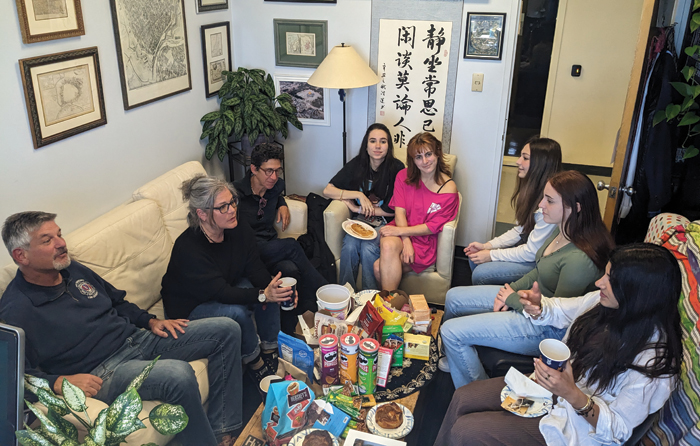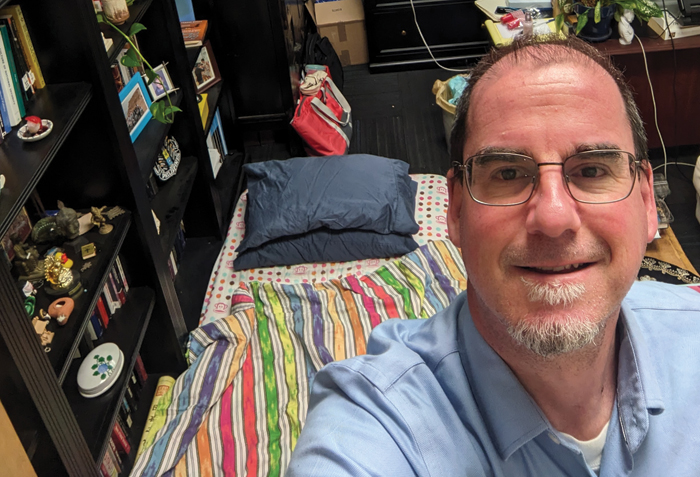
On March 7, Professor Ron Hassner, the chair of Israel studies at the University of Berkeley California, decided to stage a sit-in at his office. He brought in a mattress and has been sleeping on the floor ever since. He not only sleeps in the room, he also eats and teaches from it and doesn’t go back home to shower – or go anywhere else for that matter.
He announced his protest after Jewish students were attacked by 200 anti-Israel protestors at Zellerbach Playhouse last month. “Dear students, I have hatched a strange plan,” Hassner wrote. “I am launching a sit-in protest against antisemitism for student safety in my office, starting today, March 7 at 6pm. If my students feel that they cannot walk safely across campus without being bullied, then I will not cross campus either.”
Since then, students, parents, alumni and community leaders from around the Bay Area have flocked to his office, carrying trays of food. There are boxes of pizza, salad, cookies, brownies, challah, coffee and tea. Some people sent him food from the east coast. Once, he opened his office door to find a box filled with two dozen bagels and cream cheese, sender unknown.
It almost feels like a shivah — Hassner’s face is unshaven, he sits on the floor and people keep coming in to show support — only no one is crying, and guests seem rather cheerful. His office has become the students’ favorite hang-out place, a safe haven from antisemitism on campus. They have been craving it.
“People are here to cheer me up, to cheer one another up, and find comfort in one another’s company,” he told the Journal in a phone interview. “When I first started this, I put a little light in my window so that people across campus can see that I’m in my office at night, and know the door is always open and they can just come in.”
“I want students to be strong and resilient and proud, and I’m trying to set a good example.”
– Ron Hassner
Many of the students expressed their frustration about what’s been happening on campus since Oct. 7, especially the rise in antisemitism. “Many of them talk about not feeling safe, and I’m a little ambivalent about that,” Hassner said. “Violence has happened on this campus in the last few weeks and it’s terrible and it’s criminal and it will be prosecuted, but violence is very, very rare. There’s no real reason to feel unsafe. In fact, in part it’s important that students develop tools to confront antisemitism while they’re on campus, because the antisemitism that they will experience outside campus will be much worse. There will be no professors and no campus leadership to protect them. I want students to be strong and resilient and proud, and I’m trying to set a good example.”
Many Jewish students are disappointed by the administration’s lack of action against anti-Israel demonstrators who have bullied them since Oct. 7. No arrests were made when a mob of anti-Israel students broke windows, injured one student’s hand, strangled another and prevented a lecture by Israeli author and lawyer Ran Bar-Yoshafat. The reason given by the university spokesperson for the lack of action? There were too many demonstrators and not enough police officers.

One of Hassner’s requests for the school, before he’ll move his mattress back home, was to issue a letter of apology to Bar-Yoshafat and invite him back to Berkeley. That request was actually fulfilled, but not all of his requests, Hassner said, are as easy to implement because the university is constrained by law and by resources.
For a month now, Sather Gate has been blocked by Justice for Palestine supporters who have taken up space in the gate’s main entrance. The university recently took their caution tape down, but then a massive banner went up, and they put tables and speakers blocking the entrance and forced students to use side gates. Hassner wants the gate clear of protesters, which will require police officers to ensure they are not going to block it again.
The professor has also requested that campus leadership ensure the safety of Jewish students on campus, and mandate Islamophobia and antisemitism training for resident assistants and registered student organizations.
Hassner was born in Israel and moved to United States 30 years ago. He has been a Political Science professor at UC Berkeley for 20 years, and his classes always fill up quickly. His sit-in protest received a lot of attention, not only in California, but worldwide. He has received emails of support from Australia, Europe, Brazil and Uganda.
“People are telling me that I’m this amazing role model,” said Hassner, “and I think to myself, if a nebbish professor who’s sleeping in his clothes on a mattress in his office is your role model, then Judaism really badly needs leadership. Anybody could do this. Where are the rabbis who should be going on hunger strikes? Where are the politicians who should be marching from one campus to the next protesting this? Where are the leaders of Jewish institutions who should be joining me in my office, bringing their mattresses?
“I don’t understand it and I’m deeply baffled,” he said. “I don’t want to think that only Israelis or Zionists can do what I do. Every other Jewish person I’ve talked to so far have all the admiration in the world and all the gratitude, sincerely, but they’re not willing to take the next step. They’re willing to write, to speak, to complain, to retreat, but they’re not willing to inconvenience themselves a tiny bit and say: ‘This stops here and now. I’m going to go on a strike or I’m going to march across the city’ … something that signals that they’re willing to pay a price and put their put their money where their mouth is.”
The last thing that Hassner wants is for parents to prevent their children from attending elite universities such as Berkeley. By doing do, he said, they will do exactly what anti-Israel activists want to accomplish: rid universities from Jewish presence. It’s important to allow Jewish students to receive a high-quality education but also, without Jewish students, what will happen to all these important institutions, such as the Israel Studies Institute, Chabad Jewish student center and the Jewish Museum?
In a statement shared by the university spokesperson, it said: “Insofar as Prof Hassner’s protest is concerned, we wish to share that the university remains committed to fostering an environment conducive to robust free speech and in which all members of its community feel that they may engage in campus life without fear of harassment. The administration is committed to confronting antisemitism and holds Professor Hassner in great esteem and it is in conversation with him about his concerns.”






















 More news and opinions than at a Shabbat dinner, right in your inbox.
More news and opinions than at a Shabbat dinner, right in your inbox.